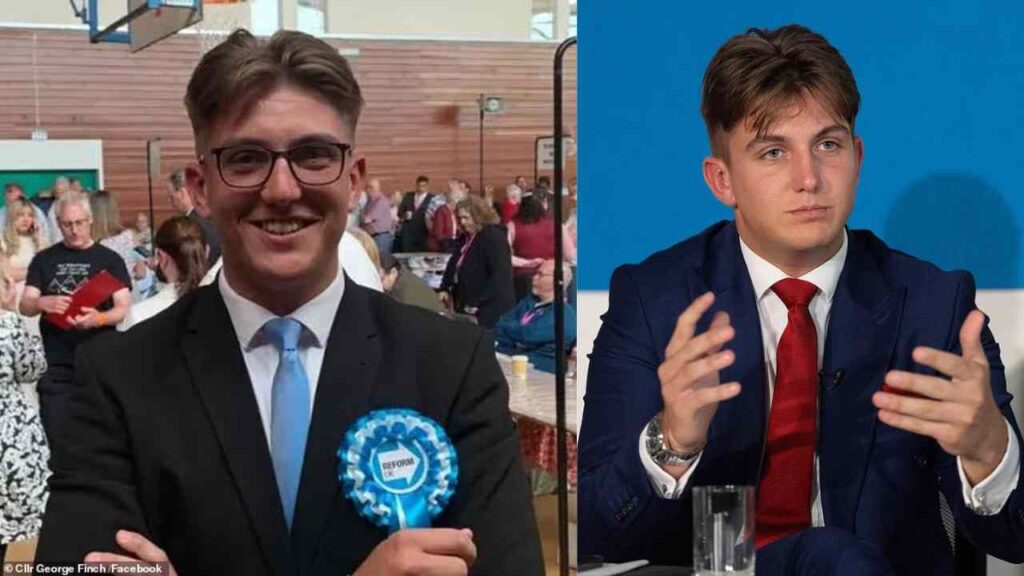The Boy Who Would Be Leader
In a modest office overlooking Warwickshire, George Finch adjusts his furniture with the casual confidence of someone twice his age. The 19-year-old has swapped student halls for Shire Hall, becoming what many believe is Britain’s youngest council leader in a political rise that has stunned Westminster watchers.
While his university peers debate philosophy over late-night pizzas, Finch grapples with a £400 million budget and 107 potholes that need fixing. It’s a responsibility that would challenge seasoned politicians, yet this Reform Party rising star approaches it with the pragmatism of someone who learned early that life doesn’t always follow conventional timelines.
From Family Crisis to Political Calling
Finch’s political awakening didn’t come from textbooks or debate societies, but from hospital waiting rooms and bureaucratic phone calls. His younger sister Harriet, 14, lives with functional neurological disorder, a condition that can suddenly rob her of the use of her arms and legs. The family’s monthly visits to A&E and battles with an overwhelmed healthcare system gave Finch an education no university could provide.
“She shouldn’t be in A&E at all,” he explains, describing his sister’s latest episode just yesterday. “What she needs is a rehabilitation plan. I can tell you about these things because I’ve lived them.”
This isn’t abstract policy for Finch. While other teenagers were learning to navigate social media, he was mastering healthcare proxy forms and crafting emails that could unlock support for his family. His parents, Stuart (a former construction worker who had to leave work after contracting sepsis) and Amy (a hairdresser turned special needs assistant), did the heavy lifting, but their eldest son became an unexpected advocate.
The Unlikely Conservative
Finch’s journey from a traditional Labour-voting household in Bedworth to Reform Party leadership reads like a political thriller compressed into a teenage timeline. Brexit served as the catalyst, awakening concerns about accountability that resonated throughout his family.
“Everyone in Bedworth would have been Labour,” he reflects. “My dad wasn’t political, but he’d have been Labour because they were the party for the working classes.”
The transformation accelerated at Leicester University, where Finch found himself increasingly at odds with both the curriculum and campus culture. He recalls being offered a Tudor period LGBT history course and thinking, “That’s a non-subject.” When lecturers defended students arrested for property damage during Free Palestine protests, his alienation deepened.
“I just want to learn,” he says, embodying a frustration that Reform has successfully channeled across Britain.

An Old Soul in a Young Body
Meeting Finch is like encountering a political time traveler. He bounds forward with the enthusiasm of a Labrador puppy, all warm handshakes and earnest eye contact, yet his cultural references skew decades older than his chronological age. His bedroom wall once featured a poster of Ronald Reagan rather than the typical teenage fare.
“That’s the kind of Conservatism we need,” he says of the former president.
His musical tastes run to Billy Joel, David Bowie, and Queen—what he calls “proper music with a bit of meaning.” Modern music, he dismisses as “gibber-jab” that “goes too fast. BOOM BOOM. What’s the point?”
This isn’t affected sophistication; it’s the genuine preference of someone who grew up fast. When other kids were playing video games, Finch was learning responsibility through family crisis. His rugby career ended with a cruciate ligament injury, but he gained something more valuable: an understanding of teamwork and resilience.
The Pragmatist’s Approach
Despite comparisons to William Pitt the Younger and Alexander the Great, Finch remains remarkably grounded about his role. The Union flag he plans to display in his office will be “propped against the wall rather than attached” due to listed building restrictions. The municipal green carpet earns a diplomatic assessment: “It’s giving library vibes, but if it does the job, that’s what matters.”
This pragmatism extends to his qualifications. When challenged about his readiness for the role, he responds with political wisdom beyond his years: “No person is qualified to be a politician. It’s about whether you have the confidence of the people and of the group, and I have all those things.”
He’s particularly dismissive of academic preparation. “What has the philosophy of politics got to do with dealing with people’s potholes or tax rates? Nothing.”
The Future of Reform
Finch embodies Reform’s attempt to capture a generation that feels disconnected from traditional politics. He’s not worried about peer judgment regarding his party affiliation, confident that accusations of racism or sexism “absolutely aren’t true.” His focus remains laser-sharp on immediate concerns—those 107 potholes won’t fix themselves.
Yet ambition clearly burns beneath the surface. He predicts Labour is “toast” and sees panic in Keir Starmer’s eyes. When asked about his own Westminster ambitions, he deflects to his original plan of becoming a history teacher, contingent on getting “the education system sorted and going back to traditional values.”
The Mother’s Perspective
The human element of this story perhaps emerges most clearly when considering the domestic reality. Finch still lives with his parents, can’t yet drive, and admits he hasn’t had a serious girlfriend (“I’ve got a job to do”). His mother sleeps each night knowing her teenager son controls a budget larger than many corporations.
Critics note that their own 19-year-olds can’t be trusted with a non-stick frying pan, yet Finch’s response reveals his political instincts: “That reflects badly on you. Why would you say that? For the record, I can run a bath.”
What Comes Next
Whether George Finch represents the future of British politics or a fascinating anomaly remains to be seen. His rise certainly challenges conventional wisdom about political preparation and generational expectations. In an era when traditional party loyalties crumble and voters seek authenticity over experience, perhaps a 19-year-old who learned politics through personal necessity rather than theoretical study is exactly what democracy needs.
For now, he’s focused on those potholes and the smooth road his mother might soon enjoy. The rest of us will watch to see if this remarkable teenager can navigate the complexities of local governance with the same determination that brought him this far.
As he settles into his rearranged office, adjusting furniture with characteristic hands-on confidence, one thing seems certain: George Finch isn’t your typical politician. Whether that’s Britain’s loss or gain, only time will tell.






